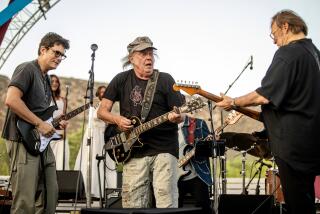Rock and Religion for the Rev. Furay
The man strumming his guitar on stage wasn’t looking to start a new career, or to revive an old one. Richie Furay left most of his rock ‘n’ roll dreams behind when he became a preacher two decades ago, content enough with his history as a founding member of Buffalo Springfield and Poco.
Now 53, Furay performed at the Coach House in San Juan Capistrano on Thursday to resurrect the country-flavored rock of his youth, but only as an occasional sideline to his spiritual life. Backed by an able six-piece band recruited from the Crossroads Church in Boulder, Colo., Furay sang with an earnest tenor, blending countrified rock with rich vocal harmonies--a sound he helped create with Poco, and which influenced such ‘70s acts as the Eagles.
“I have no aspirations at all about revitalizing a career,” Furay insisted in an interview this week. “That’s well past. I have a whole other life. But when I found out there were people still interested in hearing me sing a few songs, that’s quite a compliment and honor, and I’m willing to do that.”
This week’s brief five-night club tour marks another baby step in Furay’s increased public profile since induction with Buffalo Springfield last May into the Rock and Roll Hall of Fame. Just last year, the singer-guitarist released a gospel album, “In My Father’s House,” and performed two Southern California club dates.
On Thursday, Furay was a relaxed but focused presence in his blue jeans, plaid shirt and wire-framed specs. His songs of quiet romance share little with modern pop music, but expressed a warmth that made the 90-minute set more than a sad echo of Furay’s past.
Crucial pedal steel flourishes by John Macy helped uplift such songs as “Real Love,” a new Furay composition that sounded ideally suited to the likes of Glenn Frey of the Eagles. Furay also sounded like the pastor he is back in Boulder when he spoke of the lessons learned during his 31-year marriage, and when he sang of homelessness on “If It Wasn’t for You.”
Old Buffalo Springfield hits such as “Kind Woman” and “Go and Say Goodbye” earned the most excited crowd response, drawing on the legacy of the short-lived band that also included future pop successes Neil Young, Stephen Stills and Jim Messina.
Furay remembers last year’s Hall of Fame induction as “an awesome event,” even if it failed to include Young, who boycotted the reunion with a list of grievances against the ceremony. “The only thing that was disappointing to me is that I wish Neil would have been there with us,” Furay said. “Neil’s an interesting fellow, man. You never know quite how to read him. I love him.”
Though less celebrated, Furay’s years with Poco are also a source of pride. He founded the band with Messina in 1969 to craft a soft, countrified rock sound. But Furay left after six albums to join singer-songwriter J.D. Souther and Chris Hillman (formerly of the Byrds and the Flying Burrito Brothers) in an attempt to mirror the super-group success of Crosby, Stills & Nash.
That level of popularity never materialized, but it was during his time there that guitarist Al Perkins introduced him to Christianity in 1974. “He was a believer,” Furay said. “Quite frankly, I didn’t want him in the band at that time because I wanted to be a rock ‘n’ roll star, and I was sure that was going to be a hindrance to any agenda that I had.”
Furay had been a churchgoer as a teenager back in Ohio, though mainly as company to his girlfriend. “If anybody would have told me when I got together with Chris and J.D. that in two or three years I was going to be a pastor, I would have looked at them and said, ‘Yeah, sure. You’re crazy.’ It was the furthest thing from my mind.”
Despite his recent activity as a musician, Furay said his focus remains on his role as pastor. But he is looking forward to a possible East Coast tour this fall, and he even initiated talks recently for a potential Poco reunion.
“My life does not depend on this,” Furay said. “But I am a perfectionist; I don’t want to go out there and just slipshod through something. The guys that I’m playing with, we’ve worked hard, we’ve rehearsed. I want it to be something that people can go away with and say, ‘Man, that was good. That was real good.’ ”
More to Read
The biggest entertainment stories
Get our big stories about Hollywood, film, television, music, arts, culture and more right in your inbox as soon as they publish.
You may occasionally receive promotional content from the Los Angeles Times.











